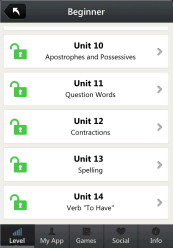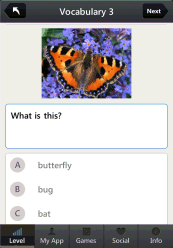English Grammar - Pre-Intermediate
Zero Conditional
Go To Quizzes >>> Conditionals
A zero conditional sentence is made up of two halves:
| If | + | Present Simple | Then | Present Simple |
English Learning Lounge - iOS and Android Apps |
||

|
Our app for both Android and iOS to help you improve your English!
|

|
We use this structure when we describe what always happens as a result of something.
It is often used to describe scientific rules which are, by definition, unchanging...so the results always happen the same.
Examples:
If you take ice out of the fridge in summer, it melts.
A stone sinks if you throw it in a lake.
We can also use the zero conditional to say what we do as a rule in certain situations. Here, we are not talking about what we do in a particular, specific situation (e.g. tonight, tomorrow) but what we always do in these conditions.
If I get a headache, I go and lie down.
If I miss the train, my sister always gives me a lift to work.
First Conditional
Go To Quizzes >>> Conditionals
A first conditional sentence is comprised of two halves.
| If | + | Present Simple | Then | Will |
We use the first conditional to say what we will do in a certain situation in the future.
If it rains tomorrow, I will stay at home and paint the kitchen.
They will see Harry if he comes to the dinner party.
The negative uses won't.
She won't get to know him if he doesn't come!
If we study so little, we won't pass the exam.
Don't use will with if.
If I see him, I will tell him.
NOT If I will see him, I will tell him.
Note. Compare the zero and first conditional. In the first sentence, we are talking about what you always do, it's your rule, if you like. In the second sentence, however, it is what you will do tonight, on that one specific occasion.
If there's nothing in my fridge, I ring for pizza.
If there's nothing in my fridge tonight, I will ring for pizza.
There are other expressions in English that are followed by the present simple in the same way as "if" is in first conditional sentences.
unless, when, in case, provided that, until, as soon as. See below for examples.
Unless
Meaning: except if.
I'll stay in a hotel, unless Joan lets me stay in her house for a few days.
In Case
To do something because you think something else will happen:
I'll take my credit card in case we see something we want to buy.
Provided That
This means "only if".
I'll lend you this $10 provided (that) you pay it back by Wednesday.
Until
Meaning: up to the point.
I'll wait in the hotel until you arrive.
As Soon As
We use "as soon as" to talk about something happening immediately after. Compare how "when" and "as soon as" are used:
I'll call you when my husband comes home. (I might wait ten minutes)
I'll call you as soon as my husband comes home. (I won't wait, it will be immediately)
Quantifiers
Go To Quizzes >>> Quantifiers
All nouns in English are divided into countable or uncountable.
Countable nouns are things like apples or cars which we can count and have plural forms.
He ate 6 apples.
She is very rich. She has four cars.
Uncountable nouns are things like water and music which we can't count and don't have plurals.
She drank a lot of water.
The film had a little music.
We cannot say:
She drank six waters. BUT She drank six glasses of water.
The film had seven musics. BUT The film had seven songs / seven pieces of music.
Here are some examples of countable and uncountable nouns in English:
| Countable | Uncountable |
|---|---|
|
Computers People Tables Bananas Bicycles CDs Clocks Pens Bottles Telephones |
Butter Cheese Wine Vodka Rice Electricity Sand Sugar Pasta Work |
Some nouns can be countable and uncountable but it changes the meaning:
How much chicken? means How much of a large chicken? What size piece do you want?
How many chickens? means How many small chickens do you want?
When we know if a noun is countable or uncountable, we then use different expressions to ask questions, to say we have a little or a lot of it. Look at this table:
| Question | Big Quantity | Small Quantity | Questions / Negatives | |
|---|---|---|---|---|
| Countable Nouns | How many? | A lot of | A few | many |
| Uncountable Nouns | How much? | A lot of | A little | much |
Examples:
How many children does she have?
How much whiskey did you drink last night at the party?
He has a lot of trees in his garden.
We have a lot of butter for the cake.
She only has a few apples so we need to go shopping.
They have a little work to do before they can leave the office.
Q: Do you have many pictures in your house?
A: I don't have many pictures but I have 3 statuettes.
Q: Do you have much land on your farm?
A: I don't have much land. Just 5 acres.
